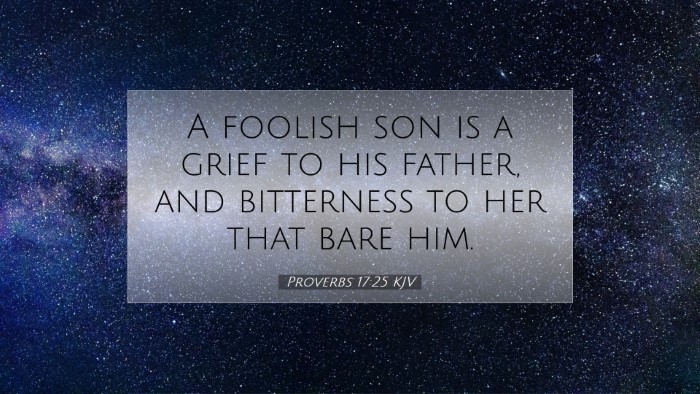Commentary on Proverbs 17:25
Bible Verse: "A foolish son is a grief to his father, and bitterness to her that bore him."
Overview and Context
The Book of Proverbs is often regarded as a source of wisdom literature that encapsulates timeless truths about life, morality, and human behavior. Proverbs 17:25 serves as a poignant reminder of the emotional and relational impacts that a foolish son can have on his parents, particularly his father. This verse underscores the significance placed on filial conduct and the expectations set upon children within the familial structure.
Insights from Matthew Henry
Henry expounds on the term "foolish," emphasizing that it refers not just to lack of intelligence but to moral and spiritual folly. A foolish son is characterized by his rejection of wisdom, living in opposition to the teachings of righteousness. His actions bring grief not only to individuals but to the entire family unit, indicating the ripple effect of a son’s decisions.
The grief mentioned here implies emotional distress and heartache that a parent endures, reflecting the father's expectations contrasted with the son's choices. Henry also highlights the bitter fruit of such folly, which extends beyond the immediate family and into the community at large. The emotional turmoil of the parents could lead to broader social consequences, illustrating the interconnected nature of personal and communal integrity.
Reflections from Albert Barnes
Barnes elaborates on the theme of sorrow that accompanies foolishness in children. He posits that the term "grief" in Hebrew denotes a profound sense of loss and disappointment. It paints a picture of a parent who sees their hopes dashed as their child strays down a path of unwise choices.
He further comments on the relationship dynamics, suggesting that a father's role is not only protective but also one of guidance. The distress that arises from a foolish son serves as a call to the parents to foster wisdom, and to both discipline and educate their children. Barnes underscores the importance of recognizing the inherent value of wisdom, which can lead to a joyous family atmosphere, contrasting sharply with the bitterness stemming from a child’s folly.
Insights from Adam Clarke
Clarke provides a pastoral perspective on the emotional implications inherent in this verse. He interprets "bitterness" as an emotional ailment that weighs heavily on the mother, symbolizing the deep-rooted connection between a mother and child. The distress arises from her nurturing efforts, invested hopes, and dreams for her son's future, which may be thwarted by his choices.
Clarke suggests that the use of "foolish son" is broader than simply an unwise act; he encapsulates a lifestyle that rejects wisdom's embrace. He implores readers to consider the preventive measures that parents can enact, including instilling values early in life, as a safeguard against the ensuing grief mentioned in the text.
Theological Implications
This verse highlights the critical importance of wisdom in the upbringing of children, illustrating the profound emotional landscape of parental relationships. The theological underpinning reveals the weight of responsibility borne by both parents and children. From a theological perspective, it reflects the wisdom of God in regulating relationships and the consequences of rejecting divine guidance.
- Parental Responsibility: The duty of parents to cultivate wisdom in their children is paramount. They are tasked with educating and modeling behaviors that eschew foolishness.
- Consequences of Choices: The verse exemplifies the principle of consequences tied to choices, demonstrating how one's actions reverberate through familial and communal environments.
- Call to Repentance: For children, this verse serves as a call to recognize the importance of aligning their lives with wisdom and righteousness, which can foster healthier relationships.
Practical Applications
For pastors, students, and theologians, Proverbs 17:25 serves as a rich ground for contemplation and practical application:
- Preaching on Wisdom: This passage can inspire sermons focused on the value of wisdom and the dangers of foolishness, particularly in the context of family dynamics.
- Parental Guidance: Practical workshops or studies for parents on nurturing their children's moral and spiritual development can stem from this verse, emphasizing proactive measures to instill wisdom.
- Counseling Wisely: In counseling situations, understanding the emotional weight borne by parents dealing with children’s foolishness can provide insight and compassion in care ministry.
- Community Engagement: Encouraging community discussions around family health and the implications of foolish living could be beneficial in fostering a culture of wisdom.
Conclusion
Proverbs 17:25 encapsulates the emotional turmoil engendered by a child's folly on parental relationships. It challenges both parents and children to reflect on their roles amidst the complexities of life. Engaging deeply with this passage offers an opportunity for growth, introspection, and renewed commitment to wisdom as a foundational element in the tapestry of family life.


